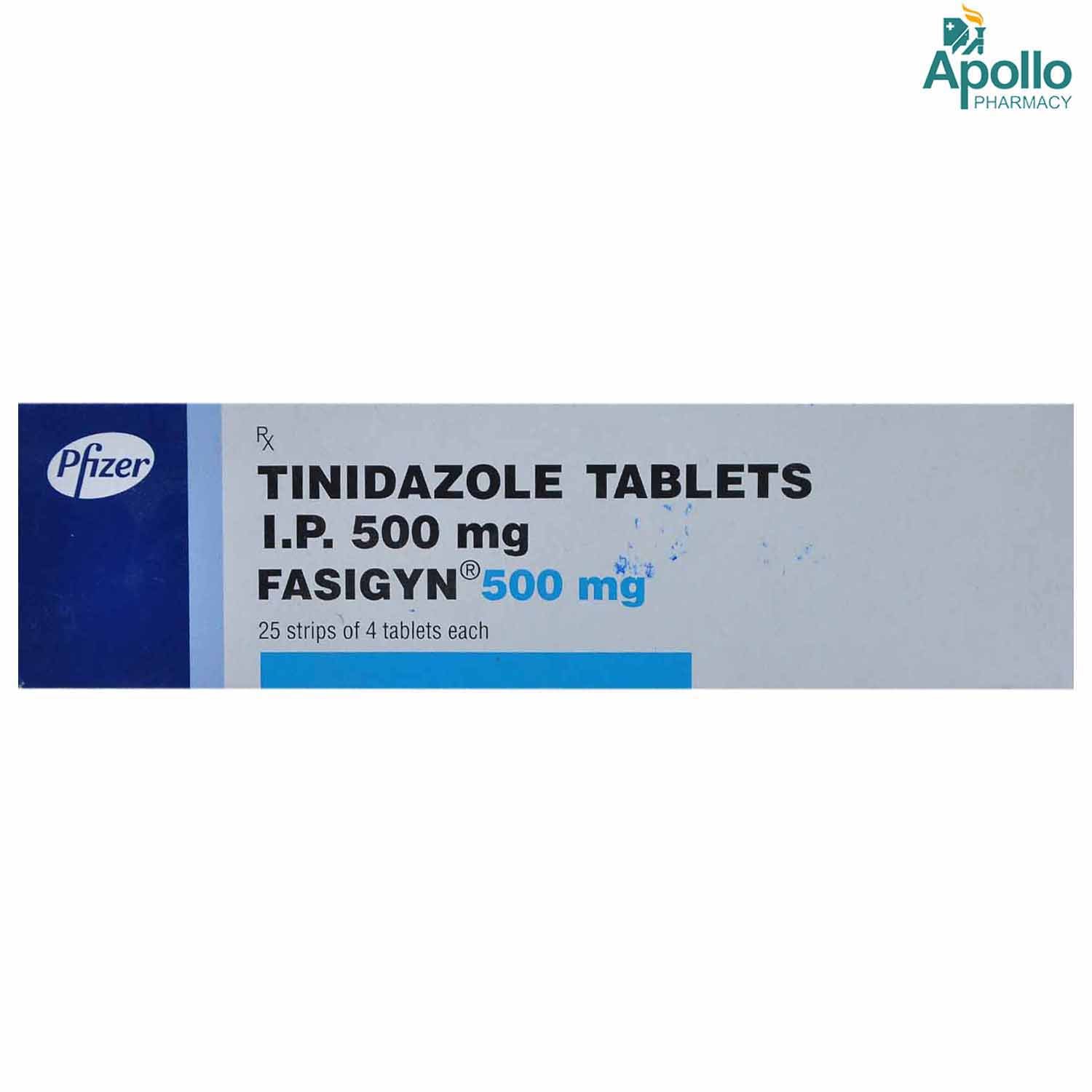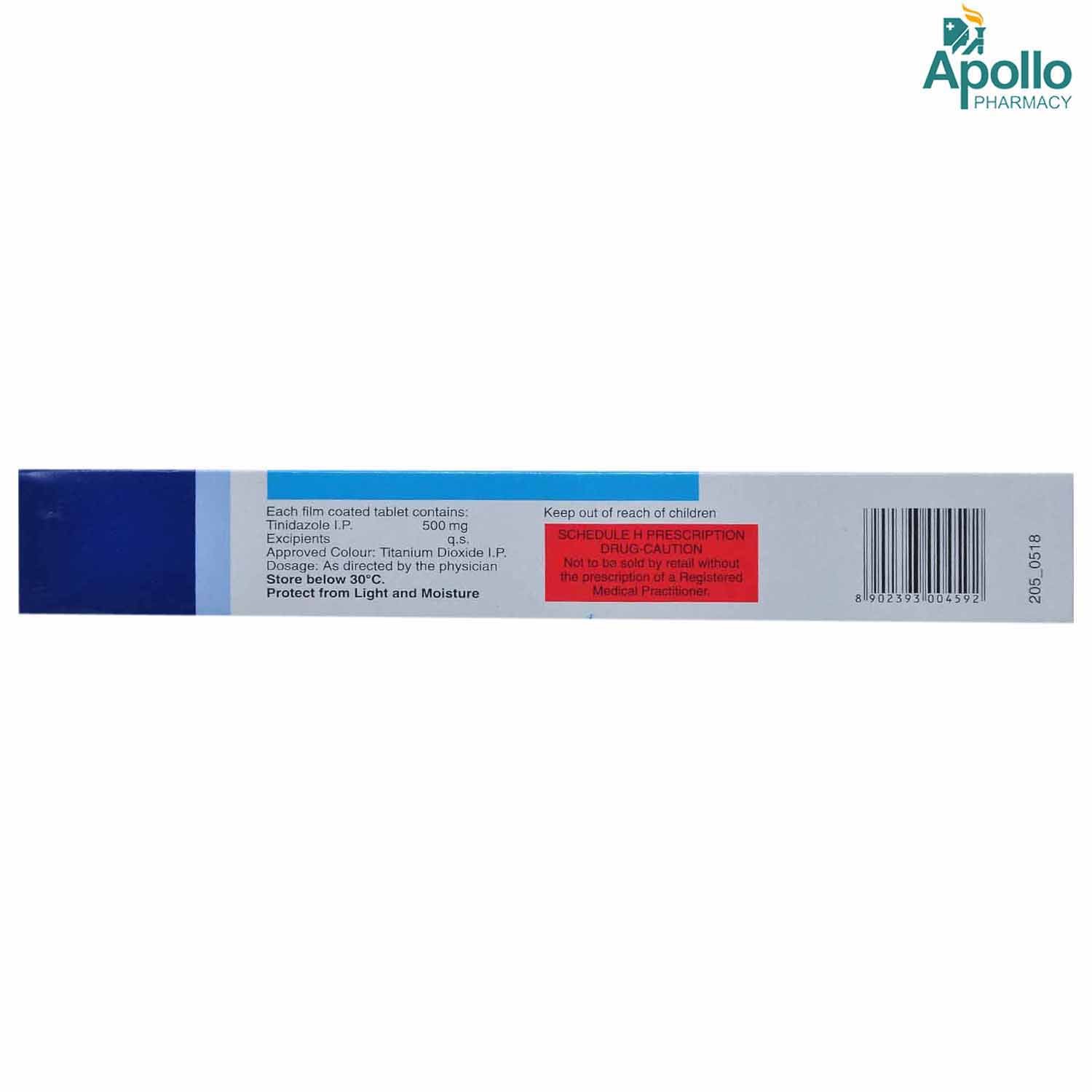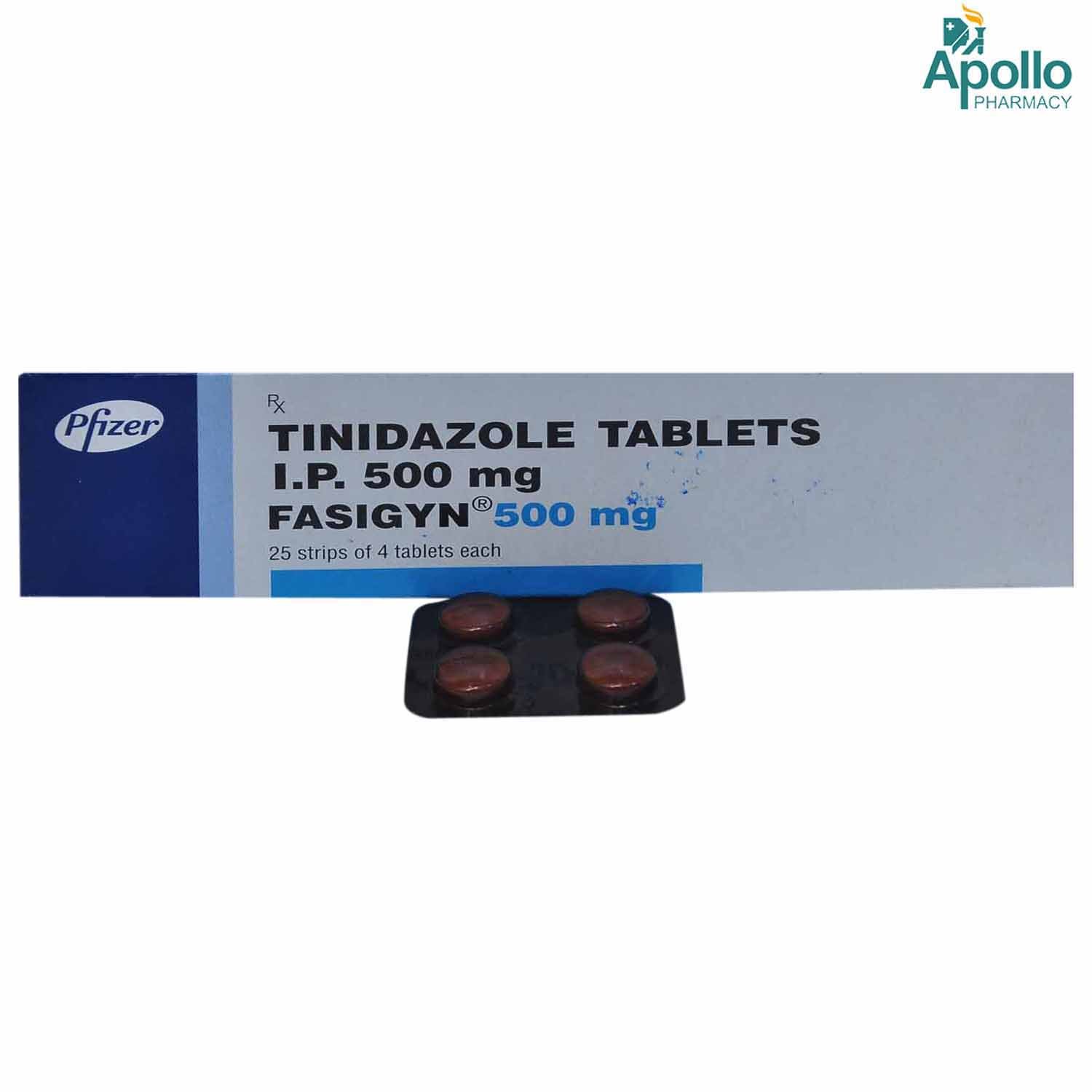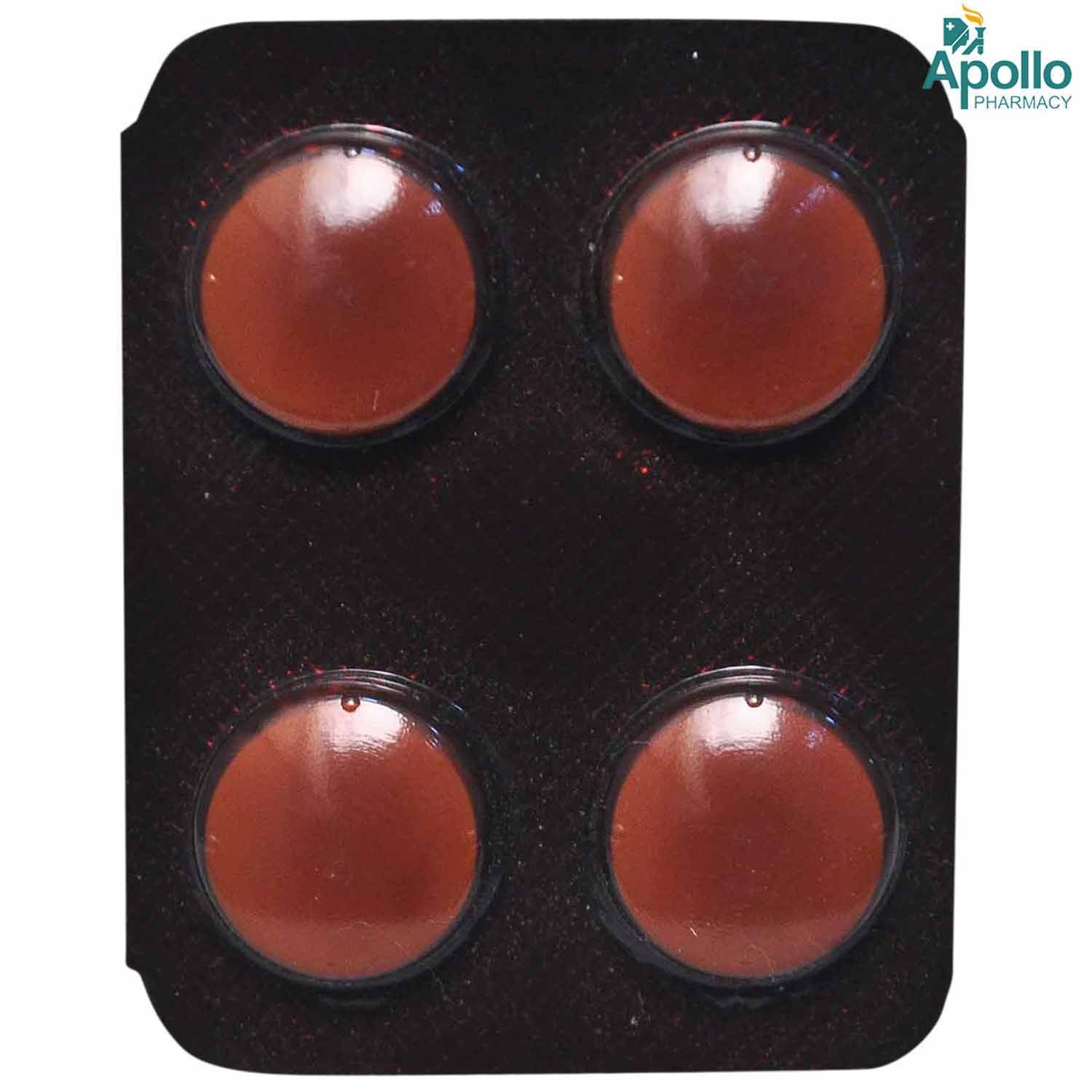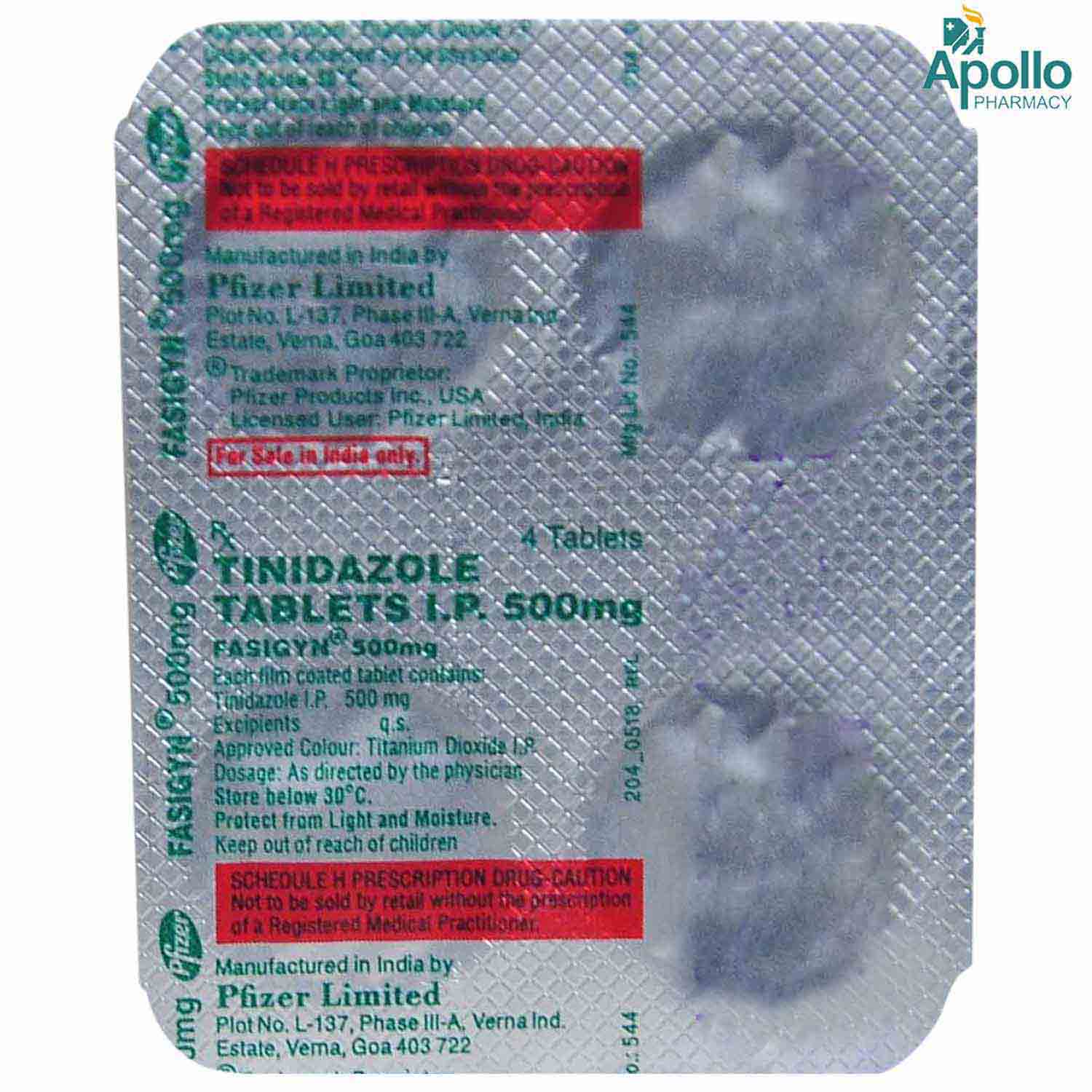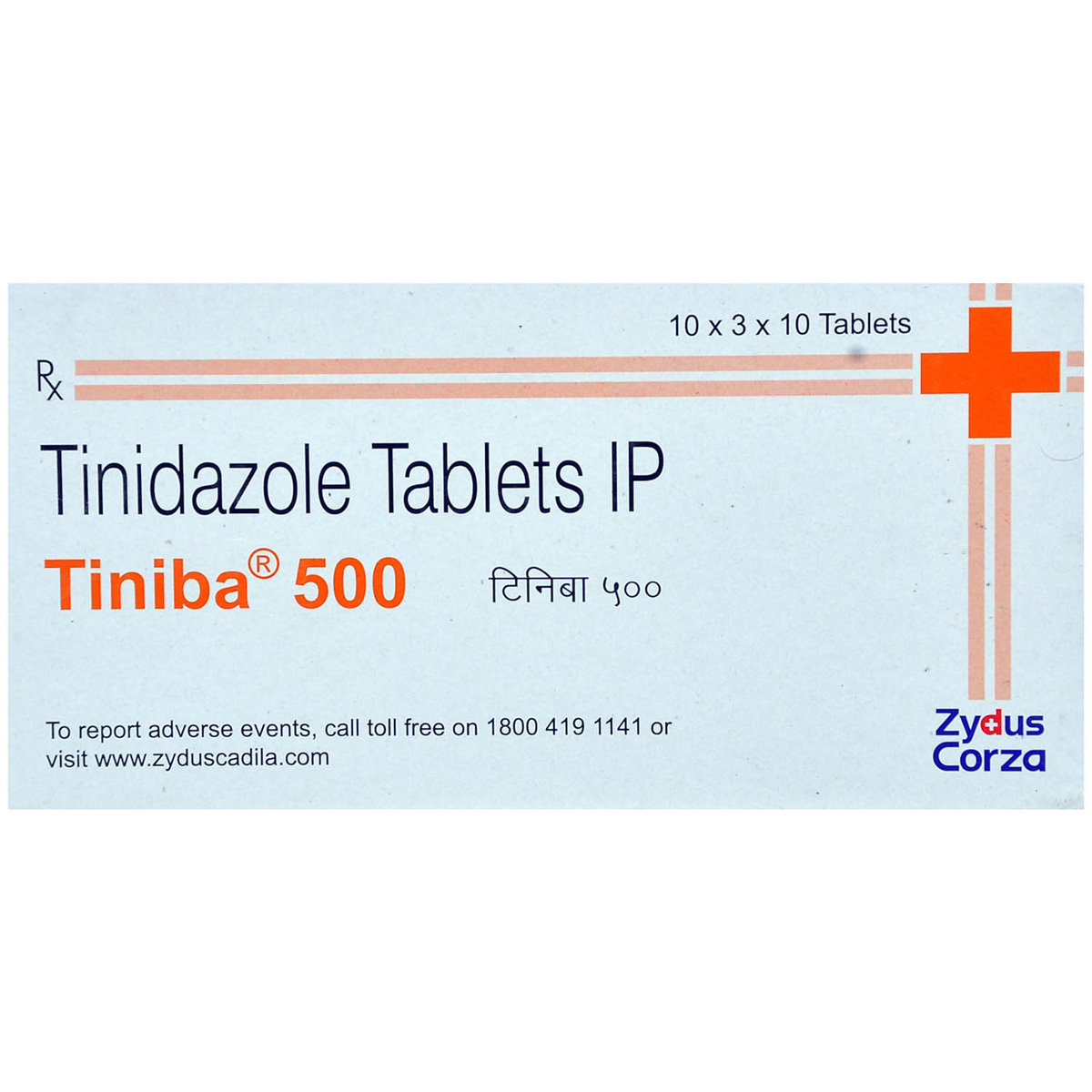Fasigyn 500 mg Tablet 4's
MRP ₹40.5
(Inclusive of all Taxes)
₹6.1 Cashback (15%)
Provide Delivery Location
Online payment accepted
 Prescription drug
Prescription drugWhats That
Composition :
Manufacturer/Marketer :
Consume Type :
Expires on or after :
Return Policy :
About Fasigyn 500 mg Tablet
Fasigyn 500 mg Tablet belongs to a class of antibacterial medications called 'nitroimidazoles', which kill infection-causing germs, mainly protozoans & bacteria. Fasigyn 500 mg Tablet is used to cure certain infections caused by microbes, especially bacteria/Protozoa, such as infection of the intestines or vagina. It is also used to treat certain sexually transmitted infections. Microbes are minute living creatures that can cause harmful effects on human beings when they enter our bodies. They induce damage by producing harmful chemicals called toxins or multiply inside healthy cells leading to their death in the process. Fasigyn 500 mg Tablet does not work against infections caused by the virus, including cold and flu.
Fasigyn 500 mg Tablet is selectively harmful to germs that don't require oxygen to survive, especially protozoa and bacteria. Fasigyn 500 mg Tablet kills microbes by entering their cells and generating harmful molecules that damage germ's DNA (Protozoans & bacteria) & hence kill them.
The dose and duration of Fasigyn 500 mg Tablet can vary depending on your condition and the severity of the infection. In some cases, you may experience common side effects such as nausea, vomiting, loss of appetite, dizziness, tremors and headaches. Most of these side effects do not require medical attention and will resolve gradually over time. However, you are advised to talk to your doctor if you experience these side effects persistently.
Before starting Fasigyn 500 mg Tablet, please inform your doctor if you have any allergies (against these antibiotics) or kidney or liver problems. Do not take Fasigyn 500 mg Tablet on your own, as self-medication may lead to antibiotic resistance in which antibiotics fail to act against specific bacterial infections. Consult your doctor before taking Fasigyn 500 mg Tablet if you are pregnant or breastfeeding. Avoid alcohol consumption while taking Fasigyn 500 mg Tablet as it may cause increased dizziness. Fasigyn 500 mg Tablet may cause dizziness and vision problems, so be cautious while driving. Fasigyn 500 mg Tablet is not recommended for use in children.
Uses of Fasigyn 500 mg Tablet
Directions for Use
Key Benefits
Fasigyn 500 mg Tablet is used to treat patients with certain vaginal, urinary, or intestinal infections or other infections in the body. These infections may be caused by anaerobic bacteria (bacteria that do not use oxygen) or amoeba. Fasigyn 500 mg Tablet kills infection-causing microbes by producing harmful chemicals inside their cells, causing DNA damage and hence killing them.
Storage
- Take medications with food (if recommended): It can help prevent stomach distress and indigestion.
- Eat smaller, more frequent meals: Divide daily food intake into smaller, more frequent meals to ease digestion.
- Avoid trigger foods: Identify and avoid foods that trigger indigestion, such as spicy, fatty, or acidic foods.
- Stay upright after eating: Sit or stand upright for at least 1-2 hours after eating to prevent stomach acid from flowing into the oesophagus.
- Avoid carbonated drinks: Avoid drinking carbonated beverages, such as soda or beer, which can worsen indigestion.
- Manage stress: To alleviate indigestion, engage in stress-reducing activities like deep breathing exercises or meditation.
- Consult a doctor if needed: If indigestion worsens or persists, consult a healthcare professional to adjust the medication regimen or explore alternative treatments.
- Inform your doctor about dizziness symptoms. They may adjust your medication regimen or prescribe additional medications to manage symptoms.
- Follow your doctor's instructions for taking medication, and take it at the same time every day to minimize dizziness.
- When standing up, do so slowly and carefully to avoid sudden dizziness.
- Avoid making sudden movements, such as turning or bending quickly, which can exacerbate dizziness.
- Drink plenty of water throughout the day to stay hydrated and help alleviate dizziness symptoms.
- If you're feeling dizzy, sit or lie down and rest until the dizziness passes.
- Track when dizziness occurs and any factors that may trigger it, and share this information with your doctor to help manage symptoms.
- If you experience persistent or severe malaise (a general feeling of discomfort, illness, or unease) after taking medication, seek medical attention immediately.
- Inform your doctor about the medication you're taking and the symptoms you're experiencing.
- Your treatment plan may be modified, which may include adjusting the dosage, substituting with an alternative medication, or discontinuing the medication. Additionally, certain lifestyle changes may be recommended to help manage symptoms.
- To manage malaise symptoms, follow your doctor's advice, such as getting plenty of rest, staying hydrated, and practicing stress-reducing techniques.
- Track your symptoms regularly and report any changes or concerns to your healthcare provider to ensure the malaise is managed effectively.
- Report the itching to your doctor immediately; they may need to change your medication or dosage.
- Use a cool, damp cloth on the itchy area to help soothe and calm the skin, reducing itching and inflammation.
- Keep your skin hydrated and healthy with gentle, fragrance-free moisturizers.
- Try not to scratch, as this can worsen the itching and irritate your skin.
- If your doctor prescribes, you can take oral medications or apply topical creams or ointments to help relieve itching.
- Track your itching symptoms and follow your doctor's guidance to adjust your treatment plan if needed. If the itching persists, consult your doctor for further advice.
- Consume more protein-rich foods and healthy fats like beans, avocados, cheese, nuts and lean meats to minimize appetite.
- Prefer foods high in fiber to help feel full for a long time.
- If you have decreased appetite, eat only when you are hungry.
- Eat several small meals or snacks all day.
- Try to take only small sips of fluids while eating.
- Inform your doctor about the symptoms you're experiencing due to medication.
- Your doctor may adjust your treatment plan, which could include changing your medication, adding new medications, or offering advice on managing your symptoms.
- Practice good hygiene, including frequent handwashing, avoiding close contact with others, and avoiding sharing utensils or personal items.
- Stay hydrated by drinking plenty of fluids to help loosen and clear mucus from your nose, throat, and airways.
- Get plenty of rest and engage in stress-reducing activities to help your body recover. If your symptoms don't subside or worsen, consult your doctor for further guidance.
Drug Warnings
Do not take Fasigyn 500 mg Tablet if you are allergic to imidazole drugs. Consult your doctor immediately if you experience tendon pain, swelling or inflammation while taking Fasigyn 500 mg Tablet. Talk to your doctor before taking Fasigyn 500 mg Tablet if you have epilepsy, low levels of potassium, nervous or muscle problems, head injury or brain tumour, diabetes, rheumatoid arthritis, heart, kidney or liver problems. Consult your doctor before taking Fasigyn 500 mg Tablet if you are pregnant or breastfeeding. Avoid alcohol consumption while taking Fasigyn 500 mg Tablet as it causes increased dizziness. Fasigyn 500 mg Tablet may cause dizziness and vision problems, so be cautious while driving. Fasigyn 500 mg Tablet is not recommended for use in children unless recommended by a doctor. If you are due to have an operation or dental treatment, please tell the person carrying out the treatment which medicines you are taking.
Drug-Drug Interactions
Drug-Drug Interactions
Login/Sign Up
Co-administration of Amprenavir and Fasigyn 500 mg Tablet can increase the risk or severity of developing serious side effects.
How to manage the interaction:
Co-administration of Amprenavir and Fasigyn 500 mg Tablet is generally avoided, as it can possibly result in an interaction, but it can be taken if your doctor has advised it. However, if you experience any symptoms like flushing, severe headache, difficulty breathing, nausea, vomiting, sweating, thirst, chest pain, rapid heartbeat, palpitation, excessive sweating, dizziness, lightheadedness, blurred vision, or confusion. Rarely, more severe reactions may include unconsciousness or convulsions, contact your doctor immediately. Do not discontinue any medications without consulting your doctor.
Drug-Food Interactions
Drug-Food Interactions
Login/Sign Up
Diet & Lifestyle Advise
- It would be best to take probiotics after taking the full course of Fasigyn 500 mg Tablet to restore some healthy bacteria in the intestine that may have been killed. Taking probiotics after antibiotic treatment can reduce the risk of antibiotic-associated diarrhoea. Certain fermented foods like yoghurt, cheese, sauerkraut and kimchi can help restore the intestine's good bacteria.
- Include more fibre-enriched food in your diet, as it can be easily digested by gut bacteria which helps stimulate their growth. Thus fibre foods may help restore healthy gut bacteria after taking a course of antibiotics. Whole grains, like whole-grain bread, and brown rice, should be included in your diet.
- Avoid taking too much calcium-enriched foods and drinks as it might affect the working of Fasigyn 500 mg Tablet.
- Avoid intake of alcoholic beverages with Fasigyn 500 mg Tablet as it can make you dehydrated and affect your sleep. This can make it harder for your body to aid the Fasigyn 500 mg Tablet in fighting off infections.
Side Effects of Fasigyn 500 mg Tablet
- Sleepiness/tiredness
- Headache
- Nausea and/or vomiting
- Dizziness or vertigo (a spinning sensation)
- Tremor
- Taste disturbances
- Skin reactions
- Numbness or tingling in your fingers or toes
Habit Forming
Therapeutic Class
All Substitutes & Brand Comparisons
RX
Out of StockTZ 500mg Tablet
Talent Healthcare
₹24.11
(₹2.17 per unit)
76% CHEAPERRX
Out of StockTinidafyl 500mg Tablet
Jagsonpal Pharmaceuticals Ltd
₹29.5
(₹2.66 per unit)
70% CHEAPERRX
Out of StockAmygyn 500mg Tablet
Elikem Pharmaceuticals Pvt Ltd
₹30
(₹2.7 per unit)
70% CHEAPER
Author Details
We provide you with authentic, trustworthy and relevant information
Drug-Diseases Interactions
Drug-Diseases Interactions
Login/Sign Up
FAQs
Drug-Drug Interactions Checker List
- AMPRENAVIR
- CHOLERA VACCINE
- TYPHOID VACCINE
Special Advise
- If a patient needs to take Fasigyn 500 mg Tablet for longer than ten days, the doctor will want him to do some tests. The patient should make sure to keep any appointments that the doctor holds.
Disease/Condition Glossary
Bacterial/Protozoal infection is a condition in which harmful bacteria/protozoa enter, multiply and infect the body. They can target any part of the body and multiply very quickly. These infections vary from minor illnesses like sore throat and ear infections to severe brain, liver & intestinal infections like meningitis, encephalitis or colitis. When you get infected with these germs, you can experience generalized symptoms, like fevers, chills and fatigue. Few harmful bacteria that commonly cause infections include Streptococcus, Staphylococcus and E. coli, whereas few harmful protozoa include amoeba, giardia etc. Anyone can get a bacterial/protozoal infection, but people with a weak immune system or taking immunosuppressive medicines like steroids are more prone to infections.

Have a query?
Alcohol
Safe if prescribed
Fasigyn 500 mg Tablet is not recommended with alcohol. Taking alcohol or using preparations that contain alcohol may result in irregular heartbeat, rapid heartbeat, low blood pressure, throbbing in the head and neck, sweating, nausea and vomiting.
Pregnancy
Consult your doctor
Fasigyn 500 mg Tablet is not prescribed in pregnant patients. Use is contraindicated during the first trimester of pregnancy. This drug should be used only under strict medical supervision or under doctors' consultation only.
Breast Feeding
Consult your doctor
Fasigyn 500 mg Tablet is not prescribed in breastfeeding mothers. There are no adequate studies on women to determine infant risk when using this medication during breastfeeding. A doctor's consultation is required before taking this drug in breastfeeding mothers.
Driving
Safe if prescribed
Fasigyn 500 mg Tablet is not recommended before driving. It may cause drowsiness or dizziness, do not drive a car or operate machinery while taking Fasigyn 500 mg Tablet.
Liver
Consult your doctor
Fasigyn 500 mg Tablet has been found to interact with the liver's functioning and increase liver-associated enzymes in the blood, thus, caution is to be taken & doctor's consultation is recommended. Due to these interactions, Fasigyn 500 mg Tablet is usually prescribed for a short period of time.
Kidney
Consult your doctor
No harmful interaction and effect on kidneys have been reported between Fasigyn 500 mg Tablet and kidney patients. Dose adjustments are required in elderly patients. The patient is advised to consult a doctor before taking Fasigyn 500 mg Tablet.
Children
Safe if prescribed
Dose adjustment is made according to age, weight and severity of the infection.

